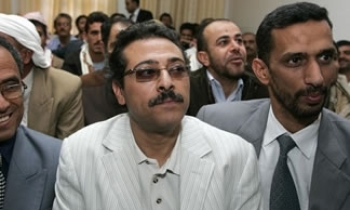ATLANTA, Georgia (CNN) -- When one of Atlanta's most notorious criminals held journalist Don O'Briant at gunpoint, the incident changed his life.
Brian Nichols had just killed three people that March morning at a downtown Atlanta courthouse where he was to be retried for rape and false imprisonment, police say. The 33-year-old was looking for another getaway car when he came across O'Briant, who was parking his green Honda in The Atlanta Journal-Constitution's garage.
Nichols pistol-whipped him, leaving the reporter with a gash across his face that took 15 stitches to close. The blow knocked O'Briant to the concrete and he broke his arm in several places. He would need surgery to repair it.
But the incident affected O'Briant in ways that couldn't be mended with stitches and couldn't be put right with a sling. Several months later, he quit his long-time job at the newspaper.
"I really felt I'd been given a second chance," O'Briant told CNN. "I started thinking about, well, 'What did I want to do with my life?'"
For a 62-year-old man who had spent decades of his life in the newspaper business -- working long hours at first on the copy desk, then becoming a reporter, then editor -- the decision to suddenly quit might seem strange.
But the brush with death changed how he saw life, he said. He wanted to do more than spend his remaining workdays in a closed-off office space.
"One thing that the Brian Nichols thing taught me was that you really can't make long-range plans. You have to enjoy every day," said O'Briant, now 63. "It's foolish to look down that road and say, 'Well, when I get to be this age, I'm going to do that.' If you really want to do something, you need to figure out a way to do it now."
The Nichols story stunned Atlanta in March 2005. For the 26 hours Nichols eluded police -- particularly that night -- people locked themselves in their houses with televisions on, wondering where the fugitive was.
Nichols eventually surrendered to authorities in an Atlanta suburb, about 30 miles northeast of the downtown courthouse. His trial is to begin this Thursday morning, at the same Atlanta courthouse complex where the shooting allegedly occurred.
For O'Briant, March 11 was a bit out of the ordinary at first only because he had arrived early to work -- a "fluke," he said. He had just parked his car in the newspaper's garage when an unknown man pulled up beside him and asked directions to a mall.
The man pulled out a handgun, demanded O'Briant's keys and told him to get into the trunk, O'Briant said. When he refused, the man struck him across his face with his gun.
O'Briant fell to the ground, but later managed to get up and run away.
Authorities said shortly before the incident, Nichols, 33, grabbed a gun from a deputy sheriff in a courthouse. He shot and killed a judge, court deputy and court reporter, then stole several vehicles during his escape. Nichols is charged with killing a fourth person, a customs enforcement agent, that night in north Atlanta.
O'Briant, a soft-spoken man with a wry sense of humor, said he had nightmares for about six weeks after the incident.
"I'd be walking down the street, and somebody would approach me, and I'd be more nervous than I'd been before," he said.
'I'm alive ... there's a reason'
As he recovered from his injuries, he began to consider his career, his family, his aspirations. "This is something I thought about. Did I want to keep doing what I was doing?" he said.
"The thing I do best is to write stories. So I figured that maybe I was still here for at least one reason," he said. "I had some books to write."
It wasn't until October 2005 that O'Briant decided to "stun" his editor, telling him, "I was going to take my vacation, come back and work one day, and then I was gone."
Now, O'Briant freelances for the AJC. He writes books, and visits his son and ex-wife in the Atlanta suburbs. He said he does yard work there, and works in the house, tends to his garden. He does things he couldn't while he was a reporter.
"As reporters, you don't notice the seasons. Every morning you get into an air conditioned building all day long, you get out and you go home and you watch TV, or do what you've got to do, and you don't look at the sky, you don't look at what's going on around you," he said.
Early in his retirement O'Briant said he made the mistake of doing too much. "When you've been used to doing a schedule for everything and work every day that long, you panic about having this free time." He joined several volunteer groups, he said, and he began playing the guitar.
"So all of a sudden I had something to do every day, almost. And I said, 'this, this is not fun,'" he said, a smile playing above the white fringe of his beard.
He learned. And he cut back. Now, a year into his retirement, he said he's enjoying this part of his life more than when he was working. "I have more control over things, over my time. I still write stuff for the paper; I like writing news stories, and I like writing features," he said.
In addition, he's begun work on his sixth book, this one about his childhood in rural South Carolina. The others he's written include a guide to Margaret Mitchell's Atlanta, and another on the hole-in-the-wall eateries and cafes in the South.
"If you're lucky, a book will be around a long time after you're gone. ... I do want my grandkids and great grandkids to know something about what my life was like," he said.
As for the Nichols incident, he is remarkably subdued. He shows little anger toward the man who he says attacked him.
"All you do is say, 'Well, I'm alive, and there's a reason for that, so I'm going to enjoy life as much as I can,'" he said.









